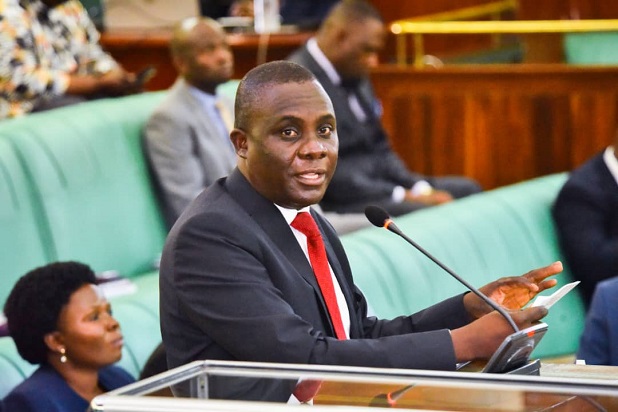URA Commissioner General John Rujoki Musinguzi speaking at the recent launch of the National Budget Month
Uganda Revenue Authority (URA) has been given an interim revenue target of Shs22.42 trillion in the Financial Year 2021/22.
During the recent launch of National Budget month 2021/22, URA Commissioner General John Rujoki Musinguzi revealed the Tax Policy Measures that have been considered and approved by parliament for FY 2021/22 to help URA achieve the Shs22.4 Trillion target.
Income Tax
Musinguzi says Government will reduce depreciation rates allowable for some selected assets from 35% to 20%. This is expected to raise Shs30bn.
URA will also discontinue concurrent deduction of initial allowances and depreciation in the first year of use of the qualifying asset. This is expected to result into Shs20bn revenue.
URA will also harmonize the tax regime for rental income derived by individuals and non-individuals with that of individuals i.e. Tax rate of 30% and providing for a cap of 75% expenses (This is expected to raise Shs13.53bn).
“The objective is to ensure that taxpayers in real estate sector claim deductions that are directly related to expenses incurred in deriving the rental income of that building and this in a way will help the individual taxpayers with the provision for more allowable expenses moving from the 20% to a maximum of 75%,” Musinguzi revealed, adding that there will also be a review of the capital gains tax regime by providing for inflation indexing (This will raise Shs46.7bn).
“This will help avoid taxing inflation and encourage acquisition of capital for investment in the country which will lead to increased employment benefits for the nationals and Country’s GDP,” Musinguzi said.
Excise Duty
This will involve broadening the scope of taxation of plastics to cover all plastics (This is expected to raise Shs41bn)
Government through URA will also reduce the excise duty on opaque beer from 30% or Shs650 per litre whichever is higher to 20% or UGX 230 per litre whichever is higher (Shs5.0Bn).
“This will help to promote production of beverages made from local raw materials and will subsequently create jobs for Ugandans employed in the sector,” the URA boss said.
He added that URA is set to introduce excise duty on fermented Beverages and this is expected to raise Shs10bn.
According to Musinguzi, this will help distribute the tax burden, improve equality and compliance amongst all producers and taxpayers and also raise revenue for Government.
Government will also introduce excise duty on alcoholic beverages and this is expected to raise Shs2.5bn). This will help create healthy competition amongst the sector players and also raise revenue for funding Government activities, Musinguzi said.
URA will also introduce a harmonized excise duty rate of 12.0% on airtime, value added services and internet data and this is expected to raise Shs60bn. “This policy is intended at removing the burden of OTT which has been a great factor for compliance challenges and enhance equality on mobile and data users,” Musinguzi said, adding that key sectors on Health, education and research are exempted from this tax.
Government will also impose excise duty of Shs100 per litre of fuel and this is expected to raise Shs90bn.
VAT
Under VAT, Musinguzi said, URA will remove the exemption on the supply of all production inputs into limestone mining and processing into clinker in Uganda and the supply of clinker for further value addition in Uganda. This is expected to raise Shs10bn.
“This policy is aimed at reducing the cost of production since it will allow for claim of input VAT by the players,” he said.
Fish
He added that come July 1st 2021, URA will introduce an export levy of 8% on the total value of fish maw exported and this is expected to raise Shs10bn.
This, he said, is aimed at promoting value addition and make Uganda’s export attractive to the foreign markets and bring more foreign exchange into the country.
Tobacco Control
Government has also imposed a levy on leaf tobacco at the rate of US Dollars 0.8 per Kg of leaf tobacco exported out of Uganda and this is expected to raise Shs20bn).
This is aimed at increasing the flow of foreign exchange into the economy and improve our balance of trade.
Mining
Government has also imposed export levy of 5% on processed gold and 10% of the value of unprocessed minerals and this is expected to raise Shs46bn.
“This is intended to increase the country’s benefits from the export of the minerals that have been imported into the country for processing as well as locally sourced minerals,” Musinguzi said.
Performance of Tax Policy measures FY 2020/21
Musinguzi noted that as at end April 2021, URA had collected Shs15.585 trillion against an annual target of Shs21.63trillion, which is 72.05% of the total revenue.
“Tax policy and Administrative measures for this FY contributed Shs905.93bn as at the end of March 2021, against a target of Shs854.88bn. Out of this, Arrears management contributed Shs709.37bn mainly attributed to implementation of Alternative Dispute Resolution and efficiency gains in the arrears management process,” he said.
URA re-positioned to deliver on her Mandate
The URA boss said in order to deliver on the expectations from Government in the medium and long term, URA has re-positioned herself by redefining her Mission, Vision and Core values, while placing special attention to the integrity of our staff, processes and systems.
“We believe that it’s through this that we shall be able to improve service offering to our esteemed Clients, re-build URA’s Credibility, improve Compliance levels and ultimately delver Uganda from Economic dependency,” he said.

He noted that in a bid to make tax policy, as presented in the National Budget speech, clearer and understandable to the taxpayer and general public, URA organizes Annual budget breakfast events that take place after the budget has been read.
He said since its inception, the National Budget Month has enhanced public awareness and understanding of the National Budget; provided an opportunity for citizens’ engagement in the Budget process; heightened accountability by Government MDAs; and, improved structured engagement within Government and with other players.






